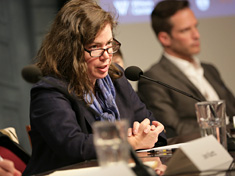-
Joan Whelan on a New Strategy at the Office of Food for Peace: Address Conflict
April 15, 2016 By Sean Peoples Since its inception more than 60 years ago, USAID’s Office of Food for Peace has provided critical food assistance to billions of people around the world. Yet, despite its name, the office lacked a strategy to address the effects of conflict on its work.
Since its inception more than 60 years ago, USAID’s Office of Food for Peace has provided critical food assistance to billions of people around the world. Yet, despite its name, the office lacked a strategy to address the effects of conflict on its work.Since its inception more than 60 years ago, USAID’s Office of Food for Peace has provided critical food assistance to billions of people around the world. Yet, despite its name, the office lacked a strategy to address the effects of conflict on its work.
“Our last strategy, 10 years ago, noted the importance of addressing conflict shocks,” says Joan Whelan, a senior policy and learning officer at the office, on this week’s podcast. But “we struggled with how to integrate conflict into our framework. We are food security actors…We speak in a language of food security.”
Food for Peace’s funding reflects its core priorities. “The vast majority of our budgets,” according to Whelan, “are spent on meeting immediate, life-saving food nutrition needs of vulnerable populations in the midst of conflicts, natural disasters, [and] other complex emergencies.”
“But,” says Whelan, “we also allocate approximately $400 million per year to longer-term resilience programs.” After a series of discussions with partners, both external and within USAID such as the Office of Conflict Management and Mitigation, a breakthrough began to emerge around this stream of funding and its potential to address conflict.
Food security – not peacebuilding – remains the program’s primary objective, according to Whelan. But a new framework allows Food for Peace to address issues that indirectly affect food security, including conflict prevention, livelihoods, financial inclusion, disaster risk-reduction, natural resource management, climate change adaptation, and more.
“Our new strategy is very resilience-focused,” says Whelan, which “means that we are carrying out work in ways that address food security risks that strengthen resilience capacities and create transformative opportunities.”
The strategy, she says, “gives us a space within our own universe to address conflict sensitivity and make sure that it’s integrated into our work in ways that strengthen our ability to address conflict risk, that help to strengthen connectors in society, and reduce the dividers.”
Joan Whelan spoke at the Wilson Center on March 8, 2016.
Friday Podcasts are also available for download on iTunes and Google Podcasts.
 A Publication of the Stimson Center.
A Publication of the Stimson Center.

 Since its inception more than 60 years ago, USAID’s
Since its inception more than 60 years ago, USAID’s 

